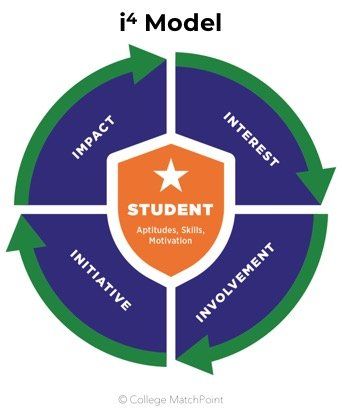This page is licensed under Creative Commons under Attribution 4.0 International. Anyone can share content from this page, with attribution and link to College MatchPoint requested.
Ask These Questions To Find A Meaningful Summer Opportunity For Your Teen
For many of today’s college-bound high school students, summer is no longer nine weeks of total relaxation, but rather an opportunity to spend time actively working, learning new skills, or diving deeper into an area (or areas) of interest. Summer is the perfect time to take calculated risks that push students into unfamiliar situations, which will help them build skills and enrich life experiences.
The key ingredient in finding the most rewarding experiences: planning. In our work with hundreds of teenagers, we’ve developed a model to help guide you and your student in identifying and exploring meaningful activities.
As you and your family review possibilities for the summer, consider these key questions—based on our i4 model—to help define your search criteria:

Interest
What activities and subject areas spark your student’s interest? How do they spend their time? What are their favorite books, YouTube videos, documentaries?
Don’t forget to consider non-traditional activities such as personal projects, research, or hobbies. For example, if your student plays drums in the church band or teaches themselves foreign languages, these are great areas for further exploration.
Involvement
How much involvement is required for each possible summer activity? When trying to decide between summer experiences, evaluate the time commitment, leadership potential, and range of responsibilities and/or learning opportunities.
Summer is a great time for a student to up their involvement level because they don't have as many other commitments.
Initiative
College admissions officers highly value when students take the initiative in planning their summer activity. For example, it takes more initiative to design a video game or start a dog walking business than it does to attend a summer program.
Think about your student’s personality and previous experiences taking initiative. Are they comfortable being more self-directed, or would they rather take part in an established program? Often, this depends both on age and personality. Younger students may feel more comfortable in a structured program while juniors and seniors may be able to work on their own to find and apply for a job, internship, academic program, or research opportunity. Or they may even be able to start their own enterprise.
Impact
How will this program or opportunity impact your student and your community? Is your student taking a risk or challenging themselves in this activity or program? Impact may come in the form of individual challenge or serving the greater good. Regardless, a great activity or program will be both engaging and impactful.
Being willing to stretch and go outside one’s comfort zone is important to grow as a person. It’s okay if your student attempts a challenging activity but ultimately fails. In fact, that would make for a great college essay.

"College MatchPoint helps steer and advise you from beginning to end of the college search and application process. They take what can be a very stressful time and break it down into smaller, manageable pieces. Bob, Lisa and their staff support their student clients, enabling them to find the best fit. You can trust that the process will work; it did for all 3 of my very different kids."
— Ellen Miura
Subscribe
Sign up with your email address to receive news and updates.
Email signup
We will get back to you as soon as possible.
Please try again later.
ALL RIGHTS RESERVED | COLLEGE MATCHPOINT | SITE BY FIX8

